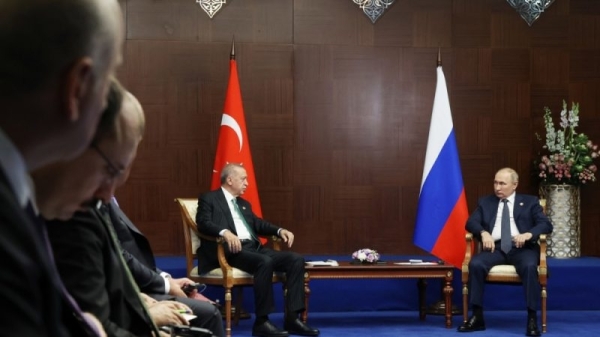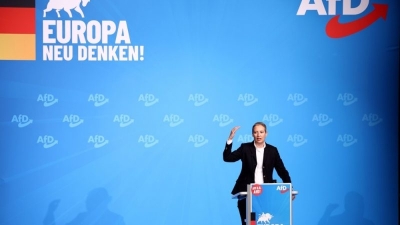Turkey and the Ukraine war: Whose side is Ankara on?

Recent signs point to a rekindling of relations between Turkey and the West, particularly on action relating to Ukraine, but long-term energy dependencies indicate that Turkey and Russia will remain close partners for the foreseeable future, writes Francesco Siccardi.
In January 2024, after a protracted negotiation period, Turkey signed off Sweden’s application for NATO membership. The decision and Ankara’s recent pitch to join the European Sky Shield Initiative (ESSI), a German-led initiative to set up an integrated European air defence system, marked an apparent break in the country’s tradition of maintaining an equidistant relationship between Russia and the West.
Yet, while these initiatives may signal an intent to improve relations with Europe and the US, they should not be viewed as a turning point in Turkey’s international posture. This is evidenced by the findings of a new report by Carnegie Europe, which notes that Turkey’s decades-long balancing act between Russia and the West is set to continue.
We need only observe Ankara’s positioning in the context of the Ukraine war for a case study of how it balances the international community’s contrasting demands. Since February 2022, it has given significant backing to Kyiv through the sale of drones, in its keeping the Turkish straits closed to warships, and in denying overflight rights to damaged Russian warplanes directed at Syria.
It also invested considerable political capital, first brokering the Black Sea Grain Initiative of 2022-2023 before joining forces with Romania and Bulgaria to clear the region of floating mines.
The country’s decision to approve Sweden’s accession to NATO also stands out, even if the ratification was tied to key concessions, including a tightening of Swedish anti-terrorism laws, a commitment from Stockholm to extradite people accused of terrorist activities in Turkey, and a US State Department agreement to sell $23 billion worth of F-16 fighter jets to the country.
By agreeing to observe secondary sanctions tied to the conflict, it has recently pivoted further westwards and is now targeting financial institutions supporting the Kremlin’s military-industrial effort by imposing limits on payments Turkish banks can make to Russian entities.
This is quite the change, given Ankara’s previous position as a bystander. But how much can we read into this, and what it means for the country’s future alignment?
The reality is perhaps best viewed through a multipolar lens. While it is true that Turkey has selectively sided with the West concerning Ukraine, it has also, in places, doubled down on its commitments to Russia, particularly across areas of trade, which have seen manifold increases since 2022.
This is especially true of energy, which has constituted the lion’s share of transactions and now places Turkey as the world’s third-largest consumer of Russian fossil fuels.
This increase in trade has strengthened relations between Ankara and Moscow – to the point that Russia accounted for approximately 40% of the oil and gas imported to the country in 2022 and over 50% of the country’s total imports of coal – and has seen Turkey an import destination for processing and re-exporting,
US and EU regulators have accused Turkey of taking a “very light regulatory approach” when checking origin certificates, given that some of the oil it receives from Russia can continue its journey into European markets after multiple ownership changes. But the reality is Turkey is keen to pitch itself as a regional energy centre, and this looks set to continue in the vein upon the cession of Gazprom’s transit agreement with Ukraine later this year.
Moscow, it seems, is happy to play into this. For example, on nuclear energy, the Akkuyu power plant, whose inauguration on the Turkish Mediterranean coast was one of the highlights of President Erdoğan’s 2023 re-election campaign, will be built, owned and operated by the Russian State Atomic Energy Corporation (Rosatom).
This will contribute $50 billion to the Turkish economy and a long-term revenue stream for Russia. And, in just the past few days, it has been announced that there will be collaboration on a second Rosatom plant at a site on the Turkish Black Sea coast.
This should raise more than an eyebrow in Europe and establish that any progress toward bringing Turkey closer towards the West will have its limits.
Yet, even with this backdrop, there is scope for broader cooperation between Brussels and Ankara, particularly across areas of shared mutual interest —including on military, visa, and refugee assistance policies and on the modernisation of the Turkey-EU customs union.
If pursued by EU leaders, these could serve as stepping stones to deeper economic cooperation and rising investment – for the benefit of both parties – and, in turn, alter Turkey’s calculations vis-à-vis- Russia.



